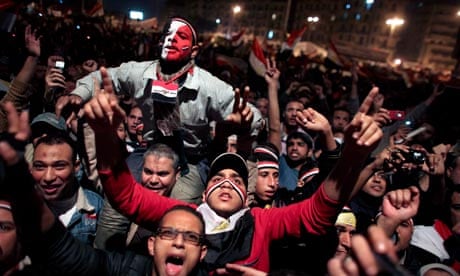Cairo, in Arabic, means "victorious". Last night the Egyptian capital lived up to its name. After 30 years of dictatorship and 18 days of struggle, the end, when it came, took most people by surprise. The crowds that had been steadily gathering outside the presidential palace all afternoon were swaying with their normal rhythm of quietly controlled passion, pockets of singing here, flags waved there. Word spread an important announcement was expected, but few held out much hope. They had anticipated triumph the night before and seen it snatched from their hands. This time, though, it would be different.
At 6pm, beneath the belle epoque domes of the building from which President Hosni Mubarak had ruled for so long, a cry went out that he was gone. Most of those below have never known another leader, and in an instant the street was convulsed with a wild, directionless surge of energy.
For a few moments it was simply a wall of sound, and Egypt's national colours blurred through the sky from every angle. And then the world came back into focus. "Freedom," roared a jubilant crush of humanity as the party got under way.
Families and friends were separated in the throng, but it didn't matter; hugs and kisses and dances were thrown out indiscriminately. People bounced from one circle of cheering youths to another; some put their national flags on the floor and began to pray; others fainted, quite overcome with the emotion.
"For 18 days we have withstood teargas, rubber bullets, live ammunition, Molotov cocktails, thugs on horseback, the scepticism and fear of our loved ones, and the worst sort of ambivalence from an international community that claims to care about democracy," said Karim Medhat Ennarah, a protester with tears in his eyes. "But we held our ground. We did it.
"My late father was part of a sit-in at the faculty of engineering in Cairo University in 1968 – the first protest seen in Egypt since Nasser took over in 1952," he added. "His generation tell me that they were not as brave as us, but they started something and played their part. Today, we finished the job for them."
Soon the march back to Tahrir Square, in the centre of Cairo, was under way, serenaded by car horns, onlookers on their balconies punching the air, and a blast of amateur fireworks that shot through the crowd at just above head height and exploded to cheers.
Tariq Ashri, a 42-year-old administrative assistant, had spent the morning walking the 10 miles down the road to the palace in a mood of defiance. Now he was walking back in joy."I feel free at last," he said. "We've had 30 years of dreaming about democracy – now tomorrow the dreaming is over and the real work begins."
Around him, a chant went up in memory of the 300 people who have died at the hands of Mubarak's forces since the protests began last month, as the 82-year-old president tried desperately to cling on to power. "Be happy, martyrs, for today we feast at your victory," his ousters sang.
Military police in red berets were all smiles and thumbs-up to the crowd. Apprehension about what might happen next in a country now under army control was being pushed aside to allow for celebrations, but as the procession reached the high-walled ministry of defence, Egyptians could not resist reminding their new overlords of who now held the balance of power in the Arab world's most populous nation.
"Here, here, the Egyptians are here," they shouted up at the darkened building, pointing down to the street. From one window, a senior officer responded with a V-sign peace salute.
And so at last they reached Tahrir, sprawling, spiritual home of this revolution that showed the world not just how a western-backed strongman could be brought down by his own people, but how broad-based, non-sectarian and all-inclusive that population could be while doing it. The square had been threatening to burst its banks for days under the pressure of those who wished to stand inside it, and now it did, sending drums, flares and a restless, rousing euphoria pulsing through Cairo's downtown streets.
In the grassy circle itself, prayer caps mingled with guitars as pyrotechnics lit up the night and parents hoisted toddlers on shoulders so they could get a glimpse of what Tahrir, the Arabic word for "liberation", really looked like. The burnt-out police trucks that once served as the protesters' barricades against the attacks of Mubarak's baltagiya (thugs) were now pressed into use as impromptu dance floors. "Goodbye, o Pharaoh," bellowed a group jumping up and down on one.
Nearby, at the mouth of Qasr el-Aini, the street leading to parliament, Ahmed Fahmy stood with a placard, one of many that had been hastily scrawled in the hours after Mubarak's departure. "Tunis and Cairo 2011: A Tale of Two Cities," it read. "It was the best of times, it was the worst of times … a novel by the people, on the Egyptian revolution."
Fahmy, a 21-year-old technology worker, said he didn't want those around him to forget their debt to Tunisia. "They inspired and supported us, now we will inspire and support the rest of the Middle East," he promised. "Tonight we party. In the morning our own struggle for democracy, and that of our brothers elsewhere, will continue."
But for many, the night's victory lay not in the machinations of politics, or in the inspiration Egypt has surely served up to the world. It came simply from a newfound feeling of self-worth inside a great country that had been left to stagnate under three decades of autocratic rule. Haisam Abu-Sabra stood in the thick of the melee. "For the first time in my life tonight, I say proudly: I am Egyptian," he said.
